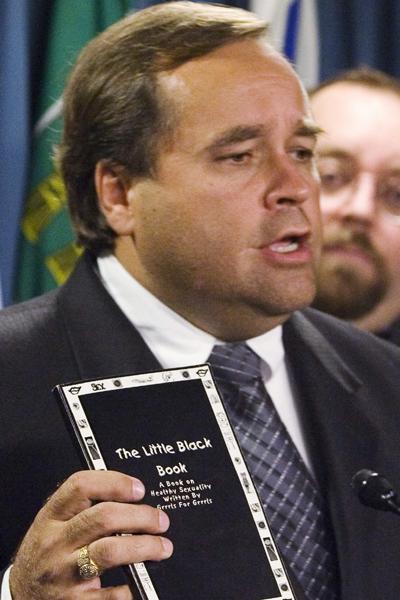When evangelical leader Charles McVety sends out a press release, the Canadian media tends to take notice. And when the issue of trans rights – in relation to Bill C-389 – came to McVety’s notice, he fired off the predictable press release full of alarmism and moral panic about “perverts in women’s washrooms.”
So why does a McVety press release get reported so widely in the mainstream media, while Bill C-389 itself doesn’t? There are opinions, just none from the actual assigning editors at the papers that covered McVety’s press release.
When asked, for example, why a McVety press release gets such attention, Sun Media/QMI’s assignment editor, Tobias Fisher, replied by email, “I am not interested in discussing our sources of information, or our editorial decision-making.”
Similarly, the journalists who wrote the stories wouldn’t go on the record, and no other assignment editors returned Xtra’s calls.
“The man is a showman,” says CBC reporter and blogger Kady O’Malley, who has covered McVety in the past. “He definitely has a knack for both the sound bite and packaging the issues in a way that makes it all but irresistible for some journalists to do so.”
So why is he so attractive to news editors?
“It’s sensationalism,” says Klaus Pohle, a journalism professor at Carleton University. “There’s really nothing new in [queer] issues. Even the fight for rights and so on – that’s been going on for years and years and likely will keep on going, and they tend to be a recitation of the obvious, so when somebody comes along and presents you with an inflammatory take on this kind of stuff, they pay more attention to it because it’s more sensational.”
That doesn’t mean that Pohle believes editors should be treating those releases as news.
“I don’t think they should give this guy the kind of exposure that he craves,” Pohle says. “That’s all he does it for, and the media play right into his hands by publishing his silly diatribes.”
“It’s just simply because this guy spews this sensational stuff, and he uses very inflammatory language, and that makes better copy than writing a story about the issues,” Pohle says.
To that end, Pohle says that rights arguments tend to be “bland,” which don’t make exciting copy to editors.
“I think it’s a disservice to the readership, because it makes out that this guy is more important than he really is.”
The influence of “pack journalism” is another reason why the story has been picked up in many venues, something that some mainstream journalists, who didn’t want to put their names on the record, tell Xtra.
“I’m not sure that just because, say, the Sun has a story about this – they have their own agenda – that necessarily the Citizen is going to follow with their own,” Pohle says, even though that did happen in this particular case.
The notion of an agenda by the Sun may also have been behind its decision to run the McVety press release, given its history of gay baiting and other forms of queer bashing.
Nevertheless, McVety’s releases may have influenced government policy in the past, as demonstrated by the Pride Toronto Marquee Tourism Program story that ended when Diane Ablonczy lost her job as the minister of state in charge of the file.
“When you looked at it chronologically, he called on his viewers and supporters to email their local MPs – all of them,” O’Malley says. “It appears that those who emailed Brad Trost of all people, were able to get a response from him, and he’s the one who came out first as an elected official and said, yes, we’re very upset about these ‘sex parades’ and we’re not going to fund them anymore, and it all unfolded from there.”
O’Malley, who has published a timeline of events on that story, notes that while it is possible the decision to review the funding and remove Ablonczy from the file had nothing to do with McVety, he did nevetheless take credit for it.
“There’s nothing on the record that would actually conflict with that,” she notes.
Despite that, the government does appear reluctant to let McVety take too much credit, as he did with the issue of Bill C-10 several years ago, which would have allowed the government to withdraw tax credits from Canadian films it deemed “contrary to public policy.”
“If you go back to The Globe and Mail story, he took credit for the government introducing it, and they went out of their way to deny that he had anything to do with it,” O’Malley says.
“There’s a wariness on the part of the government of letting Charles McVety act as though he’s able to call up the PMO and make things happen, which in fairness it doesn’t look like he can do. “


 Why you can trust Xtra
Why you can trust Xtra


